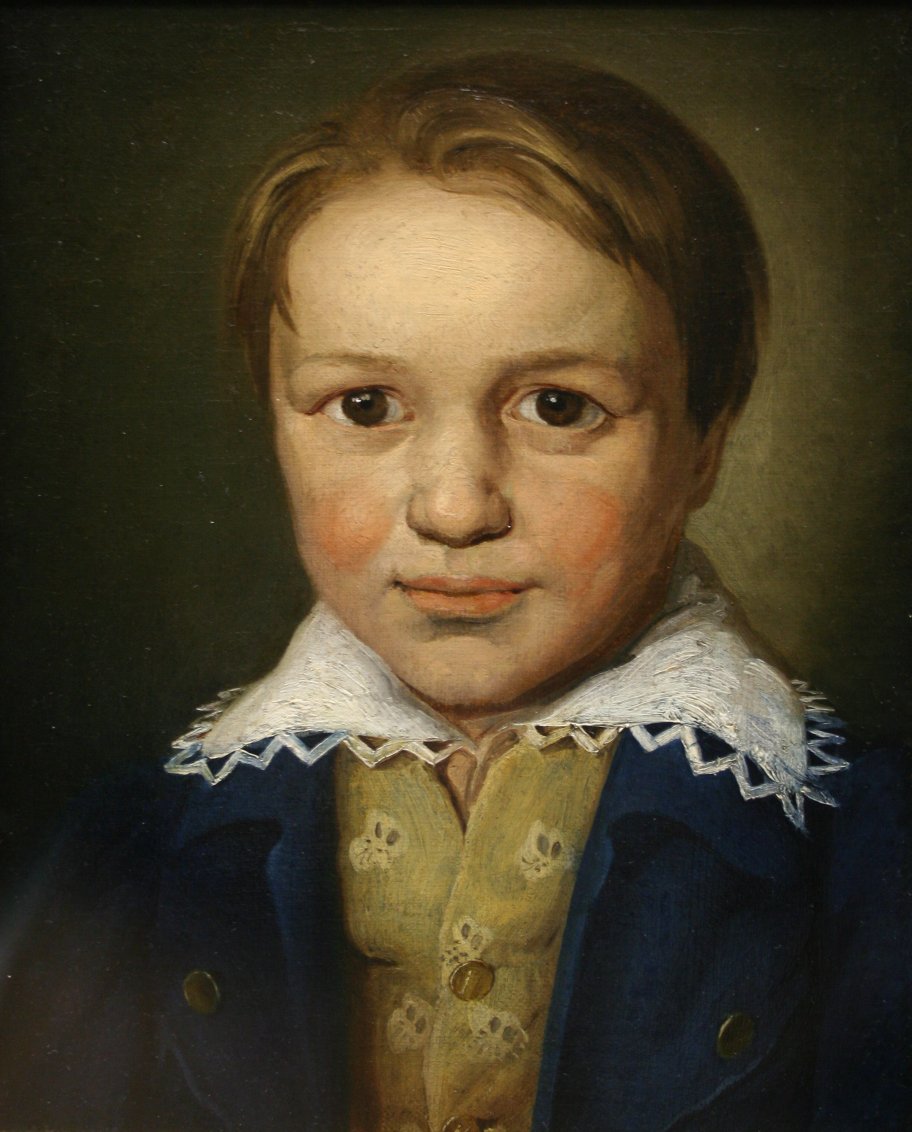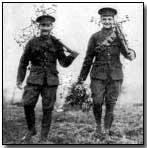

|
Use any trick you know to redeem humanity Lessen the doldrums ~ James Broughton |
1 December 2008
Photo courtesy of Panhala.net |
||
|
It stands to reason... ‘Everything that happens once can never happen again. But everything
that happens twice will surely happen a third time.’ |
2 December 2008
|
||
|
The Other Tiger
‘For me, it is as though at every moment the actual world had completely lost its actuality. As though there was nothing there; as though there were no foundations for anything or as though it escaped us. Only one thing, however, is vividly present: the constant tearing of the veil of appearances; the constant destruction of everything in construction. Nothing holds together, everything falls apart.’ — Eugene Ionesco (Can anyone refer me to the French original?) |
3 December 2008
|
||
|
Exciting as iodized salt In the world, as in our lives, much good can be accomplished with simple, quotidian thoughtfulness. It turns out that if you want to help impoverished people in the third world, the most bang for the buck can be obtained from iodized salt, for lack of which people are suffering classic thyroid symptoms: low energy, susceptibility to infection, and depressed mental acuity. Nicholas Kristof’s column in today’s NYTimes |
4 December 2008
|
||
|
The friends round about us Happiness is contagious. It spreads through social networks as widely and as rapidly as the flu. Fear and worry also can spread, but not so strongly. Fowler and Christakis found that each happy contact increases a person's odds of happiness by an average of 9%, while an unhappy contact decreases those odds by 7%*....‘I think that happiness is more likely to spread because here’s an emotion that’s about social cohesion,’ says Fowler.
New Scientist article I’ve spent the last hour searching for a quote by Thich Nhat Hanh in which he tells us that choosing the people with whom we surround ourselves is the most important determinant of our spiritual trajectory. I also remember a variant in which one Zen monk says to another that the people we choose around us represent half of our practice, and the other replies, ‘No. It is everything.’. (If you come across either of these quotes, please send them to me.) * For comparison, a 10% increase in income is associated with only a 2% increment in happiness, and even this is short-lived. |
5 December 2008
|
||
|
Empathy One day Chuang Tzu and a friend were walking by a river. “Look at the fish swimming about,” said Chuang Tzu, “They are really enjoying themselves.” “You are not a fish,” replied the friend, “So how can you truly know that they are enjoying themselves.” “You are not me,” said Chuang Tzu. “So can you truly know that I do not know that the fish are enjoying themselves?” There is a long and ridiculous history of psychological literature
denying that animals have an inner life, and attributing all empathetic
behaviors to instinct and reflex. |
6 December 2008
art by Bambi Papais |
||
|
No more Pearl Harbors When Pearl Harbor was attacked, the moral calculus seemed so simple: The Japs had no regard for individual human life. The Nazis were maniacal conquerors. We were innocent victims and noble guardians of our allies in freedom. Now we know that FDR had advance warning of Pearl Harbor [rebuttal], and that he consciously chose not to defend our base in Hawaii or to re-deploy ships, in order to shock the American people into accepting a role in the Good War. For millennia, warlords have rallied the people to do their bidding, and to feel righteous if not sanctimonious about their participation. Soldiers on both sides of the front feel virtuous and heroic as they slaughter one another, and suffer slaughter themselves. Young men lose their humanity to military discipline, and their empathy to the imperatives of war. Even the fortune ones who suffer no bodily harm return to civil society crippled and maimed. September 11 was the New Pearl Harbor ordered up by Donald Rumsfeld, William Kristol, Paul Wolfowitz and their cronies at the Project for a New American Century in 2000. But We the People have become wiser and better organized since 1941, and it is more difficult to sell us the snake oil of war. The draft is a political non-starter. Millions of Americans are on to the deceptions of our government, and thanks to the Internet we are able to share with one another the truths that traditional news organs dare not print. All wars leave residues of bitterness and hate that lead to futherr violence generations into the future. No wars are necessary or good. All war is avoidable, with patience and diplomacy and humanity. (I’ll admit to the prudence of a modestly-sized defensive army for deterrence. Switzerland has such an army, and has not fought in a war for 200 years.) A new age of peace is upon us, even as the horrors of war are in our face each day. — Josh Mitteldorf |
7 December 2008
|
||
|
What will it take? If an alien space ship landed in Times Square, would businessmen risk being late to their sales calls to pause and investigate? If we woke to find wild horses in all colors of the rainbow grazing on our front lawn, would we be shaken free from our usual notion of reality? I have heard the Holocaust described in terms of the mundanity of evil — how easily men can become inured to everyday inhumanity, so that atrocities loses their power to shock. What concerns me more is the domestication of the miraculous. How can our eyes be opened to the sublime in our everyday experience? — Josh Mitteldorf |
8 December 2008
|
||
|
L’existentialiste malgré lui I am nothing — from Tobacco Kiosk, by Fernando Pessoa |
9 December 2008
|
||
|
‘The foundation of freedom, justice and peace in the world’ The Universal Declaration of Human Rights was adopted in the UN General Assembly on this day in 1948. Freedoms, democracy, social justice, equality under the law, peace — it’s all there, spelled out in great detail. It remains to us to implement this document, and all will be well in the world. Personally dedicated to the task of preparing this Declaration, Mrs. Eleanor Roosevelt, who chaired the Human Rights Commission in its first years, asked, “Where, after all, do universal human rights begin? In small places, close to home -- so close and so small that they cannot be seen on any maps of the world. Yet they are the world of the individual person; the neighbourhood he lives in; the school or college he attends; the factory, farm or office where he works. Such are the places where every man, woman and child seeks equal justice, equal opportunity, equal dignity without discrimination. Unless these rights have meaning there, they have little meaning anywhere. Without concerned citizen action to uphold them close to home, we shall look in vain for progress in the larger world.” |
10 December 2008
|
||
|
‘Collect the rocks that they throw at you — they will be the base of your pedestal.’ «Il faut collectionner les pierres qu’on vous jette. C’est le début d’un piédestal.» Hector Berlioz was born this day in 1803. I had wanted to write about Berlioz the madman, the opium eater who composed brilliant, eccentric music, that couldn’t stick with one melody for more than a few moments. Musical opinion labeled him a freak...It became customary to think of him as a phenomenon uniquely eccentric and sui generis, and of his admirers as a race apart. - David Cairns What I found in his biography was a more responsible, though passionate man. He was better known during his lifetime as a critic and a conductor than a composer. I can’t think of an activity that requires more focus and presence of mind than conducting a symphony orchestra. He had great respect for other composers and artists of his era. He once designed to murder the family of the intended fiancée who called off his nuptials, but later behaved responsibly toward women despite his intense passions. Listen to his Roman Carnival Overture |
11 December 2008
|
||
|
Healthy mind, healthy body The ‘placebo effect’ is the the pharmaceutical industry’s word, their attempt to segregate and quantify the enormous power our minds have over the wellbeing of our bodies. The effect is best known with respect to pain. Pain is subjective and responds subjectively to suggestion. But it is also true that state of mind affects deep healing. Recovery from every disease from the common cold to cancer responds stunningly to our confidence and loving connections with others. Traditional doctors are healers as well as scientists. In the last 40 years, there has been a misguided effort to segregate the latter role and devalue the former, in an attempt to make the delivery of medical services more efficient and cost-effective. The results have been uniformly disastrous. Americans spend more health care money and suffer poorer health than anywhere in the developed world. Here is the story of a study that deeply undermines the pharmaceutical industry’s claim to measure the value of its products independent of the mental state of the patient. There is an enormous opportunity here for us to heal ourselves with our intentions, with our attention, and with the caring community around us. Mental factors are not just helpful supplements; they are as powerful as any treatment Western medical science has yet discovered. |
12 December 2008
|
||
|
This Life, which seems so fair This Life, which seems so fair, — Wm Drummond (of Hawthornden), born this day in 1585 Study what thou art |
13 December 2008
|
||
|
Hope is a Western disease It implies dissatisfaction, and it is rooted in the illusion that seeks for a resolution of our discontent through a change in circumstances. Hope is also the source of all progress. We imagine a better way of doing things, a better life. We work toward the future that we envision. Achieving the object of our ambition rarely makes us happy or fulfilled, but paradoxically the world becomes genuinely a better place. And the process of working toward a goal is in itself a source of satisfaction. Hope combined with engagement and dedicated, assiduous activity is a serviceable recipe for fulfillment. Hope is insidious only to the extent that it defers the satisfaction, and makes it dependent on an imagined future condition. Oriental and African cultures are rooted in a cognizance of the present as locus of all experiential value. We live in the age of the Global Village, the marriage of East and West in which we may hope to achieve the fruits of progress without the illusion that devalues the present. — Josh Mitteldorf |
14 December 2008
Art of Leila Bakashvili |
||
|
“Breathe in experience, breathe out poetry.” Muriel Rukeyser, born this day in 1913, seamlessly integrated a life of poetic creation with social activism. She wrote essays for the Daily Worker, and investigated environmental lung disease and deaths in WVirginia construction workers. One of her most famous poems is about seeking intimate communion with a cockroach. ‘...her life and her poetry without any separation—you couldn’t get
a knife between the two things with her. The real influence was her
human model of what a poet could be.’ |
15 December 2008
|
||
|
L. van Beethoven, man of the people It’s easy to think of Beethoven’s arrogance as a disdain for people who had less talent than he. But that’s not the way it seemed to him. He thought of himself as a champion of the common people, against pretensions of the stuffy aristocrats. He once had an extended visit with the poet (scientist and philosopher) Wolfgang Goethe, for whom he had great respect, but commented ‘The Court suits him too much. It is not becoming of a poet.’ When his clothes became impossibly shabby his friends crept into his dwelling one night and substituted new ones. Beethoven never noticed the difference when he dressed the next morning. It has been said that all of Beethoven’s personal excesses date from his loss of hearing, which was horribly painful physically as well as emotionally isolating. Considering the gifts Beethoven has left to us, it would be charitable of us to believe it. Beethoven stories Today is Beethoven’s birthday. |
16 December 2008
|
||
|
Simulated dawn David Servan-Schreiber at the Univ of Pittsburgh Center for Complementary Medicine studies non-psychiatric approaches to psychiatric issues. He has identified seven ways we can take charge of our own wellbeing and mental health:
For many of us who are affected by seasonal depression, #3 is particularly relevant this time of year. Awaking suddenly each morning in a dark room can be jarring and disruptive. There are inexpensive commercial systems that control a dimmer switch with a timer to awaken us gradually in the morning with light. Allowing time in bed to review our dreams and envision the day’s activity is a luxury we can all lavish upon ourselves. |
17 December 2008
|
||
|
Unity of life The same stream of life that runs through my veins night and day runs through the world and dances in rhythmic measures. It is the same life that shoots in joy through the dust of the earth in numberless blades of grass and breaks into tumultuous waves of leaves and flowers. It is the same life that is rocked in the ocean-cradle of birth and of death, in ebb and in flow. I feel my limbs are made glorious by the touch of this world of life. And my pride is from the life-throb of ages dancing in my blood this moment. |
18 December 2008
|
||
|
The sufficiency of time Life is long. There is time for everything you want to accomplish. There is time for everything you wish to experience. — Josh Mitteldorf |
19 December 2008
|
||
|
Infinity It’s easy to say ‘infinity’. We imagine it as simply larger than whatever is at hand. But it is a marvelous exercise to try to conjure infinity by scaling the mind up, contemplating larger and larger entities. Jorge Luis Borges, in one of his trademark short vignettes of unimaginable imaginativeness, describes a library that contains not just every thought but every possible combination of symbols (limited to 400 pages of text): All—the detailed history of the future, the autobiographies of the archangels, the faithful catalog of the Library, thousands and thousands of false catalogs, the proof of the falsity of those false catalogs, a proof of the falsity of the true catalog, the gnostic gospel of Basilides, the commentary upon that gospel, the true story of your death, the translation of every book into every language . . . Brian Hayes reviews The Unimagineable Mathematics of Borges’s Library of Babel |
20 December 2008
|
||
|
Don’t be judgmental. It’s bad, Bad BAD! Think of the last time you successfully dressed someone down for something that you thought was morally questionable, and he responded as you had hoped and changed his behavior... In a flash of lucidity, we perceive our moralizing as a ruse, an arbitrary show of sanctimony, desperate in its drive to bend another’s will to our own. |
21 December 2008
|
||
|
Sap check’d with frost Those hours, that with gentle work did frame — Shakespeare |
22 December 2008
|
||
|
Sweet Darkness When your eyes are tired When your vision has gone Time to go into the dark There you can be sure The dark will be your womb The night will give you a horizon You must learn one thing. Give up all the other worlds Sometimes it takes darkness and the sweet anything or anyone is too small for you. |
23 December 2008
Traum der Liebenden |
||
|
Christmas truce On Christmas Eve, 1914, opposing WW I soldiers got up from their trenches, declared a truce over the heads of their commanding officers, and celebrated the holiday together. Listen to John McCutcheon sing about it
I was lying with my messmate on the cold and rocky
ground |
24 December 2008
|
||
|
The trumpet shall sound, and we shall be changed |
25 December 2008
|
||
|
‘Nature is no doubt simpler than all our thoughts about it...’ ‘What today do we consider to be apart from the laws of physics, which may someday be encompassed by the laws of physics?’ ‘...He’s gone as far as he can go. He’s studied every aspect, and stretched himself to the end. So he’s up against mysteries all around the edge...so we can talk about mystery and awe - that’s what we have in common.’ ‘...These moments of revelation are so exciting...that I’ve often paid attention to what the condition is, and I can’t find any correlation with anything...It’s the hope of this kind of gold that keeps you going.’ Watch Richard Feynman talk about avoiding conventional thinking and finding new perspectives |
26 December 2008
|
||
|
A writer’s life is a highly vulnerable, almost naked activity When we look into a mirror we think the image
that confronts us is accurate. But move a millimetre and the image
changes. We are actually looking at a never-ending range of reflections.
But sometimes a writer has to smash the mirror — for it is on the other
side of that mirror that the truth stares at us. — from the end of a very political
Nobel lecture by Harold Pinter, 1930-2008 |
27 December 2008p
|
||
|
Fully Realized We are fully realized beings. It is our joy and our privilege to aid
others in the full realization of their dreams, even as we realize fully
that all human ambition and all desire arise from delusion. |
28 December 2008
|
||
|
The Soul’s Prayer
|
29 December 2008
|
||
|
Kabalevsky Born this day in 1904, Dmitri Kabalevsky was a composer of entertaining music for the masses, just what the Politburo ordered. His most memorable pieces were created for children, and they are delightfully playful, inventive and fun to play. Listen to two of them that I have played since childhood: |
30 December 2008
|
||
|
We find ourselves poised as always on the edge of the unknown, and of the unexpected each day we assimilate just so much as we are able. |
31 December 2008
|





























